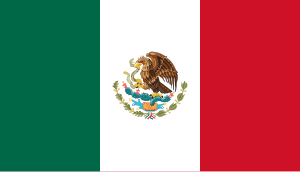Mexicans

|
|
| Total population | |
|---|---|
|
Mexican citizens: c. 132 million Mexican ancestry: c. 24 million |
|
| Regions with significant populations | |
|
|
|
|
|
11,651,419 (citizens) |
|
|
69,695 (citizens) |
|
|
47,917 |
|
|
14,481 |
|
|
14,156 |
|
|
12,286 |
|
|
11,000 |
|
|
9,377 |
|
|
7,239 |
|
|
6,625 |
|
|
6,460 |
|
|
5,254 |
|
|
4,874 |
|
|
4,601 |
|
|
4,357 |
|
|
4,187 |
|
|
3,500 |
|
|
3,070 |
|
|
2,432 |
|
|
2,351 |
|
|
2,141 |
| Languages | |
| Spanish, English and minority languages (incl. 68 federally recognized indigenous languages) | |
| Religion | |
|
Roman Catholicism 82.7% · Protestantism 9.7% other faith 2.9% (incl. Judaism · Islam · Buddhism · Hinduism · Folk religions) |
|
| Related ethnic groups | |
| other Latin Americans | |
|
^ Note A: This is the number of Mexican citizens in the U.S.. Including descendants, the enlarged Mexican-American community was estimated to be 35,320,579 in 2014. Note B: This is the number of Mexicans by birth in Canada, including ancestry the enlarged Mexican-Canadian community was recorded to be 97,055 in 2011. |
|
Mexicans (Spanish: Mexicanos) are the people of the United Mexican States, a multiethnic country in North America. Mexicans can also be those who identify with the Mexican cultural and/or national identity.
The Mexica founded Mexico-Tenochtitlan in 1325 as an altepetl (city-state) located on an island in Lake Texcoco, in the Valley of Mexico. It became the capital of the expanding Mexica Empire in the 15th century, until captured by the Spanish in 1521. At its peak, it was the largest city in the Pre-Columbian Americas. It subsequently became a cabecera of the Viceroyalty of New Spain. Today the ruins of Tenochtitlan are located in the central part of Mexico City.
The modern nation of Mexico achieved independence from the Spanish Empire; this began the process of forging a national identity that fused the cultural traits of indigenous pre-Columbian origin with those of European, particularly Iberian, ancestry. This led to what has been termed "a peculiar form of multi-ethnic nationalism"
The most spoken language by Mexicans is Mexican Spanish, but some may also speak languages from 68 different indigenous linguistic groups and other languages brought to Mexico by recent immigration or learned by Mexican immigrants residing in other nations. In 2015 21.5% of Mexico's population in Mexico self-identify as being indigenous. There are about 12 million Mexican nationals residing outside of Mexico, with about 11.7 million living in the United States. The larger Mexican diaspora can also include individuals that trace ancestry to Mexico and self-identify as Mexican.
...
Wikipedia
